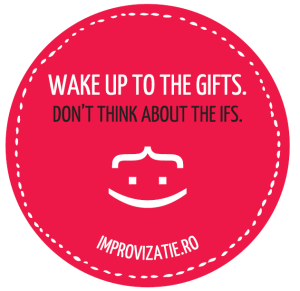Yesterday I had a lovely dinner with some fellow applied improvisers from Holland, university professors, here for a project in partnership with the Academy of Economic Studies, Bucharest. We talked a lot about the power of improvisation and how it helps you not to see problems anymore, but opportunities. Loredana said it took her almost 5 years to actually feel it, not just think it, but that now…she can do anything, whatever is there to be done she’ll just do it.
 It made me think about Dr. Dweck’s book that I just read. She says that there are two extremes on the “mindset” interval, and that we tend towards one or another (it depends on the person, but also on the situation).
It made me think about Dr. Dweck’s book that I just read. She says that there are two extremes on the “mindset” interval, and that we tend towards one or another (it depends on the person, but also on the situation).
She stresses that there are fixed mindset people who believe in inborn talents and qualities and growth mindset people who believe that through effort everyone can improve on any level. The fixed mindset is bad, the growth mindset is desirable and the book is full with examples from business, sports and more of how these two mindsets work in real life.
Robert Sternberg, the present-day guru of intelligence, writes that the major factor in whether people achieve expertise “is not some fixed prior ability, but purposeful engagement”.
The fixed mindset people tend not to challenge themselves too much. They are afraid that they will reach their level of competence and will make a fool out of themselves.
Believing that your qualities are carved in stone – the fixed mindset – creates an urgency to prove yourself over and over. If you have only a certain amount of intelligence, a certain personality, and a certain moral character – well, then you’d better prove that you have a healthy dose of them. It simply wouldn’t do to look or feel deficient in these most basic characteristics.
The growth mindset people believe that by challenging themselves they learn more, they become better. They are continuous learners, they are more open to explore and to persevere.
This growth mindset is based on the belief that your basic qualities are things you can cultivate through your effort. Although people may differ in every which way – in their initial talents and aptitudes, interest, or temperaments – everyone can change and grow through application and experience. (…) The passion for stretching yourself and sticking to it, even (or especially) when it’s not going well, is the hallmark of the growth mindset. This is the mindset that allows people to thrive during some of the most challenging times in their lives.
The good news is that we can grow a growth mindset (although I admit, the fixed minded people might disagree). I am more and more convinced with every group I work with that improvisation helps you think more like growth minded people, because it teaches you that you can turn any mistake into an opportunity, to be more open, more flexible, to trust that you can become better with practice.
You have a choice. Mindsets are just beliefs. They’re powerful beliefs, but they’re just something in your mind , and you can change your mind.
You can’t influence only your own mindset, but that of your children or students as well. Dweck had some projects in schools and she reports some incredible results. The type of praise you use seems to have a huge impact on how children think about the world, about themselves, their qualities and their ability to improve in the future.
Parents think they can hand children permanent confidence – like a gift – by praising their brains and talent. It doesn’t work, and in fact has the opposite effect. It makes children doubt themselves as soon as anything is hard or anything goes wrong. If parents want to give their children a gift, the best thing they can do is to teach their children to love challenges, be intrigued by mistakes, enjoy effort and keep on learning. That way, their children don’t have to be slaves of praise. They will have a lifelong way to build and repair their own confidence. (…)
Haim Ginott, through his lifelong work with children, came to the same conclusion. “praise should deal, not with the child’s personality attributes, but with his efforts and achievements.
I read in a review that “she is too in love with her own theory” and after reading the book I could see why someone would think that. She puts a lot of emphasis on the mindset factor when talking about success. But the truth is that your mindset, what and how you think about learning, development, self-improvement has a huge impact on how you approach the world. But this is very complex and abstract and thus hard to measure and hard to pin a success to. That’s why improvisation’s impact is hard to measure in the short term, because changes are too fundamental and complex to be reduced to one countable variable. You don’t have to trust nor me, nor Dr. Dweck, just try it and see what happens.
I’d say: work your mindset…everything else will follow!


Leave a Reply